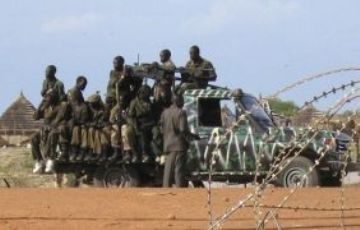South Sudan calls for improved security relations in Abyei
November 16, 2010 (KHARTOUM) – General Gier Chuang Aluong, minister of internal affairs in the regional government of south Sudan on Tuesday called for peace and improved relations among security forces in the oil producing region of Abyei.

Besides these fears, leading officials from both north and south have accused each other of sending troops and armaments to disputed areas in recent months.
Speaking to Sudan Tribune from Abyei on Tuesday, Gier said he visited the region as part of his ministerial plans to visit all the ten southern States and Abyei.
“I came to Abyei yesterday after visiting some of the Bahr el Ghazal States. The reason of the visit was to come and see challenges facing police forces on the ground instead of acting on hearsay reports,” said Gier.
The minister said he held number of meetings and briefings with security local authorities and security agents in the area.
“During this visit, I have held a lot of meetings with almost all relevant authorities. I have just finished one of the meetings with traditional leaders on security matters now, because I was not able to hold a meeting with them on arrival because I was scheduled to visit police and Joints integrated locations yesterday,” explained Gier.
The top security officer emphasized the need for an improved working relationships between the security forces in the area.
“We know misunderstanding occurs between people when situation for better working relations has not been created and maintained. It happens anywhere if little attention is paid on how two people should to live together. Relationship between the two working together is very important and this was I emphasized on the need for improved working relationships between the two forces during my meetings with them because improved relationships between the two armed forces play an important role in the security of the area,” he explained.
Deng Arop Kuol, the Abyei chief administrator, confirmed visit of the internal affairs minister.
“We received minister of internal affairs in the government of south Sudan after visiting Warrap. He spent the night with us and briefed him on current security situation. The minister himself visited police posts and held meetings with police officers and joint integrated units,” said Kuol.
The visit of the top security official from the regional government of south Sudan coincided with statement made by United Nations Mission in Sudan on Monday that “no new major build ups” of troops near the north-south border had been observed.
The statement followed an accusation made by the southern Sudan Peoples’ Liberation Army at the end of October that northern soldiers ambushed its troops inside its territory in Upper Nile State, a charge the northern army was quick to deny. The north has accused the SPLA of entering the north in Sennar.
The 2005 peace deal allows both the south and north to keep two separate armies making the SPLA and Sudan Armed Forces are the two legitimate forces in Sudan during the 6 years of interim period.
Moses Obi, the force commander of the 10,000 United Nations’ peacekeeping mission in Sudan, said patrols in hotspots and air patrols in border areas had been stepped up to check the accusations.
“We are aware that we are at a very critical moment as we get nearer the referendum. We have strengthened our monitoring mechanisms,” he told reporters in Khartoum.
The top military officer said they had found a greater alertness among troops in pre-existing military bases north and south of the border and signs of some small adjustments in military positions, but no major escalations.
“We are convinced that there has been no significant build- up along the common boundary line,” he said.
The head of the military component of the peacekeepers said conducted an independence investigation to examine reports of clash in October concluded that no serious exchange of fire between two armed forces had occurred.
(ST)
